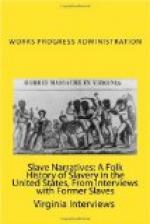REFERENCE
1. Personal interview with Harriett Gresham, 1305 West 31st, Street, Jacksonville, Florida
FEDERAL WRITERS’ PROJECT American Guide, (Negro Writers’ Unit)
Alfred Farrell, Field Worker
John A. Simms, Editor
Dive Oak, Florida
August 30, 1936
BOLDEN HALL
Bolden Hall was born in Walkino, Florida, a little town in Jefferson County, on February 13, 1853, the son of Alfred and Tina Hall. The Halls who were the slaves of Thomas Lenton, owner of seventy-five or a hundred slaves, were the parents of twenty-one children. The Halls, who were born before slavery worked on the large plantation of Lenton which was devoted primarily to the growing of cotton and corn and secondarily to the growing of tobacco and pumpkins. Lenton was very good to his slaves and never whipped them unless it was absolutely necessary—which was seldom! He provided them with plenty of food and clothing, and always saw to it that their cabins were liveable. He was careful, however, to see that they received no educational training, but did not interfere with their religious quest. The slaves were permitted to attend church with their masters to hear the white preacher, and occasionally the master—supposedly un-beknown to the slaves—would have an itinerant colored minister preach to the slaves, instructing them to obey their master and mistress at all times. Although freedom came to the slaves in January, Master Lenton kept them until May in order to help him with his crops. When actual freedom was granted to the slaves, only a few of the young ones left the Lenton plantation. In 1882 Bolden Hall came to Live Oak where he has resided ever since. He married but his wife is now dead, and to that union one child was born.
Charlotte Martin
Charlotte Mitchell Martin, one of twenty children born to Shepherd and Lucinda Mitchell, eighty-two years ago, was a slave of Judge Wilkerson on a large plantation in Sixteen, Florida, a little town near Madison. Shepherd Mitchell was a wagoner who hauled whiskey from Newport News, Virginia for his owner. Wilkerson was very cruel and held them in constant fear of him. He would not permit them to hold religious meetings or any other kinds of meetings, but they frequently met in secret to conduct religious services. When they were caught, the “instigators”—known or suspected—were severely flogged. Charlotte recalls how her oldest brother was whipped to death for taking part in one of the religious ceremonies. This cruel act halted the secret religious services.
Wilkerson found it very profitable to raise and sell slaves. He selected the strongest and best male and female slaves and mated them exclusively for breeding. The huskiest babies were given the best of attention in order that they might grow into sturdy youths, for it was those who brought the highest prices at the slave markets. Sometimes the master himself had sexual relations with his female slaves, for the products of miscegenation were very remunerative. These offsprings were in demand as house servants.




